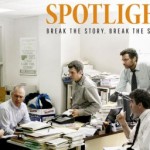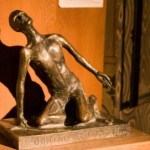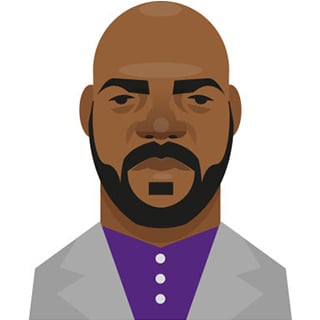 The moral life, says American Catholic poet Marie Howe, is lived out in what we say as much as what we do — and so words have a power to save us.
The moral life, says American Catholic poet Marie Howe, is lived out in what we say as much as what we do — and so words have a power to save us.
And because words have power that can save us, words can also condemn us. Power tends to corrupt, as Lord Acton observed.
Jesus, according to Matthew, said as much: Truly I tell you, whatever you bind on earth will be bound in heaven, and whatever you loose on earth will be loosed in heaven. Again, truly I tell you, if two of you agree on earth about anything you ask, it will be done for you by my Father in heaven. For where two or three are gathered in my name, I am there among them.”
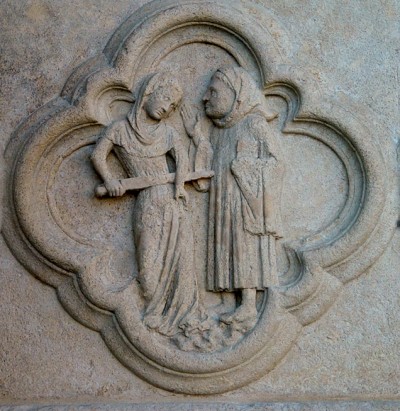 Speaking of dangerous words, Ann Lamott , in her book Bird by Bird, talks about drive-by shootings of the mouth, words by which, in the course of an ordinary day, we take one another down. Friends, strangers, family members, we are all survivors of these, and we are, when we least expect it, shooters.
Speaking of dangerous words, Ann Lamott , in her book Bird by Bird, talks about drive-by shootings of the mouth, words by which, in the course of an ordinary day, we take one another down. Friends, strangers, family members, we are all survivors of these, and we are, when we least expect it, shooters.
Relating, reacting, refuting, reporting, rehearsing, redefining: these are the uses of words; and these are the spiritual exercises we daily practice.
No wonder Jesus admonishes us, saying it is not what we put into our mouths that pollutes us, but what comes out of our mouths, for, he says, what comes out of the mouth comes out of the heart, and shows the condition of the heart.
 We pour over Jesus’ words, examining stories in detail to help us navigate the dangerous journey of our lives, the journey we are making between heaven and hell, between salvation and ruin, between God and the Devil. And all the while we are using words, making and breaking relationships, straining to tell the truth as we know it
We pour over Jesus’ words, examining stories in detail to help us navigate the dangerous journey of our lives, the journey we are making between heaven and hell, between salvation and ruin, between God and the Devil. And all the while we are using words, making and breaking relationships, straining to tell the truth as we know it
I’m struck by Jesus’ plea, that if two of us, if only two of us, can agree about what we long for, it will be done. Clearly he doesn’t have high expectations of unity from us. Nor does he substitute choired recitations for heartfelt prayers. If two of you agree on earth . . .
Looking around our earth, his assessment of the difficulty of human agreement seems on the mark. Who would have imagined this century would begin with holy wars, that the label infidel would be invested with so much meaning, that the destruction of infidels would become a legitimation for warfare centuries after we thought that was over?
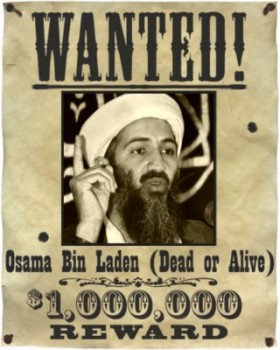 And who would have thought the political divisions in America and most European countries as well would take on such rancorous character?
And who would have thought the political divisions in America and most European countries as well would take on such rancorous character?
Most of the public rhetoric is about steps on the journey to hell or heaven, with emphasis on hell. Rarely do we hear the words that families speak to each other all the time: It will be all right . . . . whatever happens, it will be all right.
According to Matthew Jesus gave pretty specific instructions about resolving arguments. You sit down and talk about it. And if there is no listening, you bring in someone else to sit down with you.
But this is not so easy as it sounds. Ask the Market Basket cousins, Arthur T and Arthur S. Endless boardroom meetings seemed to only make it worse. Ask Congress. Ask any couple, getting a divorce, if they tried talking, and most will say talking was what ended the marriage.
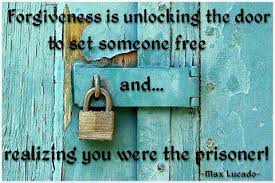 As for listening, well, it depends on how your heart hears the other person: as an enemy, as a wrong-doer, as someone you need to instruct, as a betrayer . . . or as a friend.
As for listening, well, it depends on how your heart hears the other person: as an enemy, as a wrong-doer, as someone you need to instruct, as a betrayer . . . or as a friend.
Frederick Buechner says of forgiveness, To accept forgiveness means to admit that you’ve done something wrong that needs to be forgiven . . . When somebody you’ve wronged forgives you, you’re spared the dull and self-diminishing throb of a guilty conscience.
When you forgive somebody who has wronged you, you’re spared the dismal corrosion of bitterness and wounded pride.
For both parties, forgiveness means the freedom again to be at peace inside their own skins and to be glad in each other’s presence.
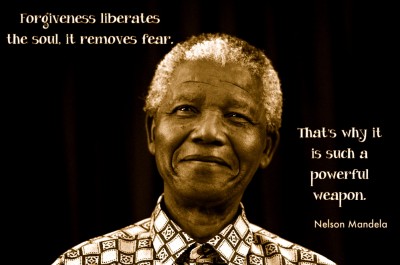 Marie Howe, in her poem The Meadow, writes:
Marie Howe, in her poem The Meadow, writes:
Bedeviled,
human, your plight, in waking, is to choose from the words
that even now sleep on your tongue, and to know that tangled
among them and terribly new is the sentence that could change your life.
May we learn new words.
_______________________________________________
Illustrations:
1. Argument. Google Images.
2. Example of Anger. 1220. Cathedrale d’Amiens, France. Relief Sculpture in Stone. Vanderbilt Divinity School Library, Art in the Christian Tradition.
3. Wrath, by Hieronymous Bosch, Early 15th c. Vanderbilt Divinity School Library, Art in the Christian Tradition.
4. Bin Laden Poster. Google Images.
5. Door of Forgiveness. Poster. Google Images.
6. Mandela Poster. Google Images.


